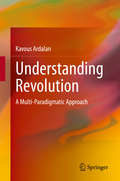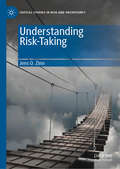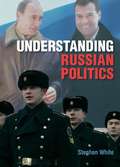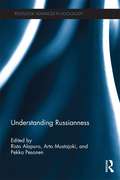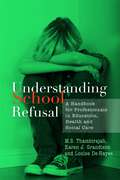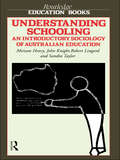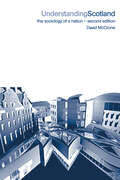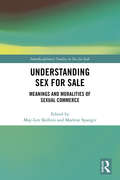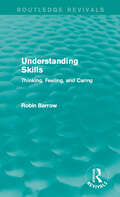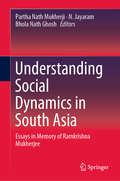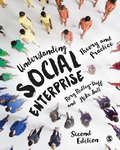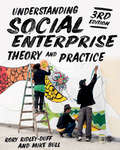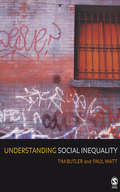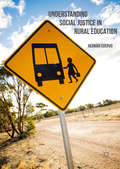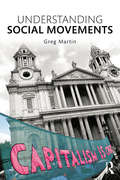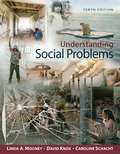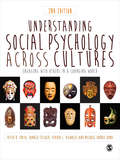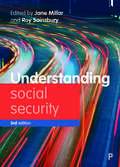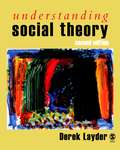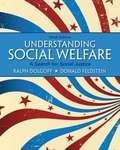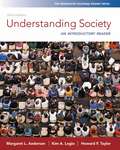- Table View
- List View
Understanding Revolution: A Multi-Paradigmatic Approach
by Kavous ArdalanThis book applies a multiparadigmatic philosophical frame of analysis to the topic of social revolution. Crossing two disciplines and lines of literature—social philosophy and social revolution—this book considers different aspects of social revolution and discusses each aspect from four diverse paradigmatic viewpoints: functionalist, interpretive, radical humanist, and radical structuralist. The four paradigms are founded upon different assumptions about the nature of social science and the nature of society. Each paradigm generates theories, concepts, and analytical tools that are different from those of other paradigms. An understanding of different paradigms leads to a more balanced understanding of the multi-faceted nature of the subject matter.In this book, the first chapter reviews the four paradigms. Using the Iranian Revolution as exemplar, the next few chapters provide paradigmatic explanations for a particular aspect of revolution: culture, religion, ideology. With this background, the book introduces a comprehensive approach to the understanding of revolution. The final chapter concludes by recommending further paradigmatic diversity. This book will be of particular interest to students and researchers interested in social revolution, political sociology, and political theory.
Understanding Risk-Taking (Critical Studies in Risk and Uncertainty)
by Jens O. ZinnThis book outlines and systematises findings from a growing body of research that examines the different rationales, dimensions and dynamics of risk-taking in current societies; providing insight into the different motivations and social roots of risk-taking to advance scholarly debates and improve social regulation. Conceptually, the book goes beyond common approaches which problematise socially undesirable risk-taking, or highlight the alluring character of risk-taking. Instead, it follows a broadly interpretivist approach and engages in examining motives, control, routinisation, reflexivity, skills, resources, the role of identity in risk-taking and how these are rooted in and framed by different social forces. Zinn draws on qualitative studies from different theoretical and conceptual backgrounds such as phenomenology, hermeneutics, pragmatism, feminism, class analysis, theory of practice and discourse analysis among others, to outline key distinctions and concepts central to the understanding of risk-taking. It will be a key resource for everyone who is concerned with the understanding and management of risk-taking in all kinds of social domains, such as immigration, youth, leisure sports, crime, health, finance, and social policy.
Understanding Russian Politics
by Stephen WhiteA fresh and compelling interpretation of Russian politics by a leading authority, this textbook focuses on political developments in the world's largest country under Putin and Medvedev. Using a wealth of primary sources, it covers economic, social and foreign policy, and the 'system' of politics that has developed in recent years. Opposing arguments are presented and students are encouraged to reach their own judgements on key events and issues such as privatisation and corruption. This textbook tackles timely topics such as gender and inequality issues; organised religion; the economic krizis; and Russia's place in the international community. It uses numerous examples to place this powerful and richly-endowed country in context, with a focus on the place of ordinary people which shows how policy is translated to Russians' everyday lives.
Understanding Russianness (Routledge Advances in Sociology)
by Risto Alapuro Arto Mustajoki Pekka PesonenIn today’s world where other cultures are being tapped to a greater extent than ever before, the processes of mixing and matching are especially relevant in making sense of Russia. Not only do borrowing and assimilation, interaction between the familiar and the alien, constitute a venerable tradition in Russian culture, but during the two last post-Soviet decades a notable Western influence has become apparent. This book provides means for understanding Russianness in this new situation. By bringing together Russian and Western, eminent and younger scholars it provides insights both from inside and outside. By extending its perspectives to three fields – linguistics, cultural studies, and social sciences – it covers different dimensions of creative misunderstandings , hybrids, tensions and other modes of adaptation in the Russian culture. By offering concrete case studies it avoids easy stereotypes, deconstructs clichés, problematizes accepted truths, and identifies points of interaction between Russia and the West.
Understanding School Refusal: A Handbook for Professionals in Education, Health and Social Care
by M. S. Thambirajah Karen J. Grandison Louise De-Hayes` Combining educational and clinical perspectives, and with extensive use of case studies, the authors present recent research into the mental health problems associated with school refusal, such as anxiety and panic attacks, as well as the role that parental support plays in their children's school life. They also discuss the role of home tuition services and pupil referral units in extreme cases of school refusal, and provides concrete strategies for planning and organising services to manage the problem effectively. Understanding School Refusal is a valuable guide for professionals across the disciplines of education, health and social care, and will also be useful for training courses within these fields.' Education Today School refusal is a crippling condition in which children experience extreme anxiety or panic attacks when faced with everyday school life and this handbook aims to explore and raise awareness of the problem of school refusal in children and young people, and provide plans and strategies for education, health and social care professionals for identifying and addressing this problem. Combining educational and clinical perspectives, and with extensive use of case studies, the authors present recent research into the mental health problems associated with school refusal, such as anxiety and panic attacks, as well as the role that parental support plays in their children's school life. They also discuss the role of home tuition services and pupil referral units in extreme cases of school refusal, and provides concrete strategies for planning and organising services to manage the problem effectively. Understanding School Refusal is a valuable guide for professionals across the disciplines of education, health and social care, and will also be useful for training courses within these fields.
Understanding Schooling: An Introductory Sociology of Australian Education
by Sandra Taylor John Knight Robert Lingard Miriam HenryFirst published in 1990. Routledge is an imprint of Taylor & Francis, an informa company.
Understanding Scotland: The Sociology of a Nation
by David McCroneUnderstanding Scotland has been recognised since publication as the key text on the sociology of Scotland. This wholly revised edition provides the first sustained study of post-devolution Scottish society. It contains new material on:* the establishment of the Scottish parliament in 1999* social and political data from the 1997 general elections* the new cultural iconography of Scotland* Scotland as a European society.For anyone wishing to understand Scottish society in particular or the general issues involved in nation building, McCrone's clear-headed coherently argued account of the main issues will be essential reading.
Understanding Sex for Sale: Meanings and Moralities of Sexual Commerce (Interdisciplinary Studies in Sex for Sale)
by Marlene Spanger May-Len SkilbreiThe problem of prostitution, sex work or sex for sale can often be misunderstood, if we do not take into consideration its spatial, temporal and political context. Understanding Sex for Sale aims to understand how prostitution, sex work or sex for sale are delineated, contested and understood in different spaces, places and times; with a particular focus on identifying how the relation between sex and money is interpreted and enacted. Divided into three parts, this interdisciplinary volume offers contributions that discuss ongoing theoretical issues and analytical challenges. Some chapters focus on how prostitution, sex work, or sex for sale have been regulated by the authorities and on the understandings that regulations are built upon. Other chapters investigate the experiences of sex workers and sex buyers, examining how these actors adjust to or resist the categorisation processes, control and stigma they are subjected to. Finally, a third group of chapters discuss contemporary definitional issues produced by various actors tasked with controlling prostitution or offering social services to its participants. Advancing and placing analytical tools at the forefront of the discussion, Understanding Sex for Sale appeals to undergraduate and postgraduate students, as well as researchers interested in fields such as, sociology, anthropology, criminology, history, human geography and gender studies.
Understanding Skills: Thinking, Feeling, and Caring (Routledge Revivals)
by Robin BarrowIt is widely agreed that education should involve the development of understanding, critical thinking, imagination, and emotions. However, this book, first published in 1990, argues that our views to these key concepts are confused and inaccurate, and therefore what we do in schools is generally inappropriate to our ideal. This book will be of interest to students of education and philosophy.
Understanding Social Divisions
by Shaun BestThe study of social divisions has dominated research within the social sciences since the nineteenth century. Early stratification categories of class, race, and gender, have in more recent years been joined by issues such as sexuality and disability. Understanding Social Divisions addresses the full range of social divisions in one volume while also considering the nature of social division in itself, in a comprehensive and accessible overview. Shaun Best: outlines and evaluates theories and research from a long historical period looks at how social divisions influence the formation of identity and `the other′; discusses the mechanisms that are drawn upon to maintain social divisions; considers how solidarity is maintained given that most people in society may feel in some way divided from the rest of society; and, explores how individuals place themselves within the social divisions of class, gender, sex and sexuality, race and ethnic diversity, disability and mental illness. The concluding chapter explores the role of the State in the processes of social division, in areas such as: asylum, citizenship, childhood, old age, disease and policing of terrorism. This book is essential reading for students of social divisions from a wide variety of social science backgrounds.
Understanding Social Dynamics in South Asia: Essays in Memory of Ramkrishna Mukherjee
by N. Jayaram Partha Nath Mukherji Bhola Nath GhoshThis volume includes fourteen essays by eminent sociologists in memory of Ramkrishna Mukherjee (1919–2017), the last of the founding architects of sociology in India. It also includes two interviews with Ramkrishna Mukherjee by senior sociologists. The essays cover a variety of themes and topics close to the works of Ramkrishna Mukherjee: the idea of unitary social science, methodology of social research, the question of facts and values, rural society and social change, social mobility, family and gender, and nationalism. In the two interviews included here Mukherjee clarifies his intellectual trajectory as well as issues of methodology and methods in social research. Overall, this volume endorses his emphasis on the need for social researchers to transcend the ‘what’ and ‘how’ to ‘why’ in the pursuit of sociological knowledge. The volume is a valuable addition to the history of sociology in India. Students of sociology and other social sciences will find it useful as a book of substantive readings on social dynamics; those researching the social world will find in it a useful guide to issues in designing and execution of social research projects.
Understanding Social Enterprise
by Rory Ridley-Duff Mike BullThe emergence of social enterprises over the past 25 years has been an exciting and significant development in the economy at a local, national and international level. How should we understand the growing popularity of social enterprise? Are alternative business models even more relevant in an uncertain business climate? How does Social Enterprise fit into the wider social context? In 12 comprehensive chapters the authors discuss and illustrate both theoretical and practical considerations for the field. The book: - Focuses on different and distinct approaches to Social Enterprise and social economy - Contains comprehensive coverage of employee-owned, cooperative, community and charitable enterprises - Looks at private, voluntary and public sector differences. - Examines managerial issues for social enterprises: strategic thinking, leadership, HRM, governance and globalisation. - Draws on international debates and examples. - Includes extensive learning features such as: summaries, international case studies, reflection boxes, further reading and links to online information about social enterprise projects. - Is accompanied by a companion website with a full instructors " manual, including PowerPoint slides and extra case studies for lecturers, and access to full-text journal articles for students.
Understanding Social Enterprise: Theory and Practice
by Rory Ridley-Duff Mike BullThe emergence of social enterprises over the past 35 years has been an exciting and significant development in the economy at a local, national and international level. How should we understand the growing popularity of social enterprise and the wider social economy? Are alternative business models even more relevant in an uncertain business climate? Do they provide a robust response to periods of state 'austerity'? How do social enterprises contribute to global initiatives to improve the sustainability and responsibility of the business community? Through discussion of theoretical and practical considerations for the field, and a wealth of learning features, this 2nd edition of Understanding Social Enterprise: Focuses on the distinct pathways that social enterprises follow, critiquing the competencies and practices that contribute to a successful social economy Contains updated coverage on sector issues, including the recent development of the social investment industry Explores how private, voluntary and public sector agencies engage the social economy, and how distinctive new forms have emerged from it Examines the management of social enterprises in different contexts within the social economy Contains updated coverage of international issues informed by global studies of the social economies. Revisions include a new, tripartite structure and two new chapters on 'Marketing and Measuring Social Value' and 'Social Investment and Crowd Funding'. Visit the companion website for sample curricula, instructors’ manual, PowerPoint slides and extra case studies for lecturers, and access to full-text journal articles for students.
Understanding Social Enterprise: Theory and Practice
by Rory Ridley-Duff Mike BullThe emergence of social enterprises over the past 35 years has been an exciting and significant development in the economy at a local, national and international level. How should we understand the growing popularity of social enterprise and the wider social economy? Are alternative business models even more relevant in an uncertain business climate? Do they provide a robust response to periods of state 'austerity'? How do social enterprises contribute to global initiatives to improve the sustainability and responsibility of the business community? Through discussion of theoretical and practical considerations for the field, and a wealth of learning features, this 2nd edition of Understanding Social Enterprise: Focuses on the distinct pathways that social enterprises follow, critiquing the competencies and practices that contribute to a successful social economy Contains updated coverage on sector issues, including the recent development of the social investment industry Explores how private, voluntary and public sector agencies engage the social economy, and how distinctive new forms have emerged from it Examines the management of social enterprises in different contexts within the social economy Contains updated coverage of international issues informed by global studies of the social economies. Revisions include a new, tripartite structure and two new chapters on 'Marketing and Measuring Social Value' and 'Social Investment and Crowd Funding'. Visit the companion website for sample curricula, instructors' manual, PowerPoint slides and extra case studies for lecturers, and access to full-text journal articles for students.
Understanding Social Enterprise: Theory and Practice
by Rory Ridley-Duff Mike BullThis updated edition of Understanding Social Enterprise comes packed with a wealth of learning features to help students understand the theory and practice within this ever expanding field. Updates to this edition include: New case studies and examples throughout Considerations of new developments in policy, the economy and legal implications of social enterprise A focus on the pathways that social enterprise follow
Understanding Social Enterprise: Theory and Practice
by Rory Ridley-Duff Mike BullThis updated edition of Understanding Social Enterprise comes packed with a wealth of learning features to help students understand the theory and practice within this ever expanding field. Updates to this edition include: New case studies and examples throughout Considerations of new developments in policy, the economy and legal implications of social enterprise A focus on the pathways that social enterprise follow
Understanding Social Inequality
by Paul Watt Tim Butler"This is a book that should be read by anyone interested in class, inequality, poverty and politics. Actually, probably more importantly it should be read by people who think that those things do not matter! It provides a wonderful summation of the huge amount of work on these topics that now exists and it also offers its own distinctive perspectives on a set of issues that are - despite the claims of some influential commentators - still central to the sociological enterprise and, indeed to political life." - Roger Burrows, University of York "A clear and compelling analysis of the dynamics of social and spatial inequality in an era of globalisation. This is an invaluable resource for students and scholars in sociology, human geography and the social sciences more generally." - Gary Bridge, University of Bristol With the declining attention paid to social class in sociology, how can we analyze continuing and pervasive socio-economic inequality? What is the impact of recent developments in sociology on how we should understand disadvantage? Moving beyond the traditional dichotomies of social theory, this book brings the study of social stratification and inequality into the 21st century. Starting with the widely agreed ′fact′ that the world is becoming more unequal, this book brings together the ′identity of displacement′ in sociology and the ′spaces of flow′ of geography to show how place has become an increasingly important focus for understanding new trends in social inquality.
Understanding Social Justice in Rural Education
by Hernán CuervoThis book explores what social justice looks like for rural schools in Australia. The author challenges the consensus that sees the distribution of resources as the panacea for the myriad challenges faced by rural schools and argues that the solution to inequality and injustice in rural settings has to take into account other important dimensions of social justice such as recognition and association. These include teachers' concerns for issues of power, respect, and participation in their work that extend to policy-making processes and implementation; students' post-school aspirations and, finally, parents' hopes and fears for their children's futures and the sustainability of their community. The book brings together political and social theory with education and youth studies, provides new insights about the complex nature of schooling in rural places, and makes a strong connection between schooling and the people and communities it serves.
Understanding Social Movements
by Greg MartinThis book offers a new and fresh approach to understanding social movements. It provides interdisciplinary perspectives on social and cultural protest and contentious politics. It considers major theories and concepts, which are presented in an accessible and engaging format. Historical and contemporary case studies and examples from a variety of different countries are provided throughout, including the American civil rights movement, Greenpeace, Pussy Riot, indigenous peoples movements, liberation theology, Occupy, Tea Party, and the Arab Spring. The book presents specific chapters outlining the early origins of social movement studies, and more recent theoretical and conceptual developments. It considers key ideas from resource mobilization theory, the political process model, and new social movement approaches. It provides an expansive commentary on the role of culture in social protest, and looks at substantive areas in chapters dedicated to religious movements, geography and struggles over space, media and movements, and global activism. Understanding Social Movements will be a useful resource for undergraduate and postgraduate students across disciplines wanting to be introduced to or extend their knowledge of the field. The book will also prove invaluable for lecturers and academic researchers interested in studying social movements.
Understanding Social Problems 10th Edition
by David Knox Caroline Schacht Linda A. MooneyFilled with current topics and relevant examples that illuminate the content, Mooney, Knox, and Schacht's UNDERSTANDING SOCIAL PROBLEMS provides you with a comprehensive, theoretically balanced exploration of social problems. The text progresses from a micro to macro level of analysis, focusing first on such problems as illness and health care, drugs and alcohol, and family problems, and then broadening to the larger issues of poverty and inequality, population growth, aging, environmental problems, and conflict around the world. The social problem in each chapter is framed in a global as well as a U. S. context. In addition, the three major theoretical perspectives are applied to the problem under discussion, and its consequences -- as well as alternative solutions -- are explored. Features such as "The Human Side" and "Self and Society" enable you to grasp how social problems affect the lives of individuals and apply your understanding of social problems to your own life.
Understanding Social Psychology Across Cultures: Engaging with Others in a Changing World (Sage Social Psychology Program Ser.)
by Vivian L. Vignoles Ronald Fischer Peter B. Smith Michael H. BondUnderstanding Social Psychology Across Cultures Second Edition starts by asking why social psychology needs a cross-cultural perspective. It then examines cultural differences and their origins, before addressing traditional social psychological themes cross-culturally, for example group processes, self and identity, intergroup relations. Themes of contemporary relevance including migration, ethnic conflict and climate change are also covered.<P><P> Key features:<P> * Presentation of concepts and theories made accessible to the reader using practical examples and everyday life experiences from diverse parts of the world<P> * Biographical portraits of key researchers in the field<P> * Coverage of the appropriate methods for conducting state-of-the-art cross-cultural research<P> This textbook is appropriate for students of social and cross-cultural psychology. It will also interest practitioners wanting to understand the impact of culture on their fields of work, such as international relations, social policy, health promotion, ethnic relations and international business.
Understanding Social Security 3e: Issues for Policy and Practice (Understanding Welfare: Social Issues, Policy and Practice)
by Jane Millar and Roy SainsburyThe political and economic landscape of UK social security provision has changed significantly since the 2008 financial crisis. This fully revised, restructured and updated 3rd edition of a go-to text book covers all the key policy changes and their implications since the elections of 2010 and 2015. With contributions from leading academics in the field this book critically examines the design, entitlement, delivery and impact of current welfare provision. The first half of the book examines social security across the lifecycle from Child Benefit to retirement pensions. The second half focuses on key issues in policy and practice including new topics such as the realities of life on benefits in an era of austerity, and the pros and cons of Universal Basic Income. • Framework supports teachers and students, encouraging analytical thinking of issues and providing pointers to related sources • Authoritative and evidence-based arguments • Clear section and chapter summaries, overviews, questions for discussion, website resources and a bibliography • Includes tables, charts and text boxes for clarity, interest and appeal This book is suitable for undergraduate and postgraduate students of Social Policy taking modules on Social Security Policy, Poverty and Inequality, Income Support and Welfare Reform, as well as Social Work students and those on other Social Science degree programmes.
Understanding Social Theory
by Derek Layder"This is a robust text - challenging and provocative and one which students will benefit from reading. Layder guides the reader through a large body of relevant literature. He draws attention to the strengths and weaknesses of particular approaches as he sees them and he is not afraid to offer his own judgements on the issues and problems he addresses." - Professor John Eldridge, University of Glasgow "One of the most comprehensive, incisive and readable treatments of the macro-micro problem now available." - Professor Paul Colomy, University of Denver This is a revised, updated and enlarged version of the accessible, authoritative first edition - a jargon-free textbook that provides an introduction to the core issues in social theory. It includes: Chapter previews, summaries and a glossary of key terms. A ′problem focus′ that encourages students to acquire skills of argument and discussion. A concluding chapter relating theory to social domains. Relevant examples from everyday life to illustrate key theoretical issues. It is essential reading for undergraduate and postgraduate students of social and sociological theory.
Understanding Social Welfare: A Search For Social Justice
by Ralph Dolgoff Donald FeldsteinFocuses on values and the historical impact of socio-economic structures Understanding Social Welfare: A Search for Social Justice is presented in an organized, comprehensive, and scholarly manner, including social policy concepts. It is accessible to students and helps them acquire the basic tools for understanding, analyzing, and evaluating social welfare policies and programs. This text focuses on the impact of social structure on people's lives, emphasizing the current concerns of diverse client populations and the search for social justice. It places U. S. welfare in philosophical, political, economic, and international contexts, and includes the latest discussion of policy issues related to gay men and lesbians. A better teaching and learning experience This program will provide a better teaching and learning experience--for you and your students. Here's how: Personalize Learning -- MySearchLab delivers proven results in helping students succeed, provides engaging experiences that personalize learning, and comes from a trusted partner with educational expertise and a deep commitment to helping students and instructors achieve their goals. Improve Critical Thinking -- Challenges readers to make their own decisions as they encounter policies and programs with enhanced knowledge and analytic skills. Engage Students -- Presents the historical evolution of social welfare and focuses on issues, trends, and conflicts in the context of influential societal developments and values. Explore Current Issues -- Includes the latest discussion of policy issues related to gay men and lesbians. Support Instructors -- An Instructor's Manual and Test Bank, Computerized Test Bank (MyTest), Blackboard Test Item File, MySearchLab with Pearson eText, and PowerPoint presentations are included in the outstanding supplements package. Note: MySearchLab does not come automatically packaged with this text. To purchase MySearchLab, please visit: www. mysearchlab. com or you can purchase a valuepack of the text + MySearchLab (at no additional cost): ValuePack ISBN-10: 020522296X / ValuePack ISBN-13: 9780205222964
Understanding Society
by Kim A. Logio Margaret L. Andersen Howard F. TaylorStrongly rooted in research, the 70 papers in this supplemental textbook explore different sociological perspectives on culture, deviance and crime, global stratification, race, gender, family, religion, education, work, health care, population, and urbanization.
